 |
North West USA | part 1 |
Sunday14 May 2023
WWe spent the night in the Sheraton at Amsterdam Airport Schiphol,
because we leave early today for America and we want to check in at 6:50
am. It is remarkably quiet at Schiphol and we don't have to stand in
line anywhere. It is quiet at the luggage drop-off and the security
check and also at the restaurants for breakfast.
The KLM flight departs half an hour later than planned because there is
an older couple on board, of which the wife is not feeling well. The
captain does not want to take them on the flight, because of the risk
that her situation could worsen. The pair disagree, but eventually
disembark anyway. Nevertheless, we arrive on time in San Francisco.
Around noon we arrive in San Francisco, happy to know that our home team
of Feyenoord Rotterdam have become football champions of the Netherlands
during our flight. There is a long queue for immigration. We have to
wait in line for almost 40 minutes.
We take the BART (Bay Area
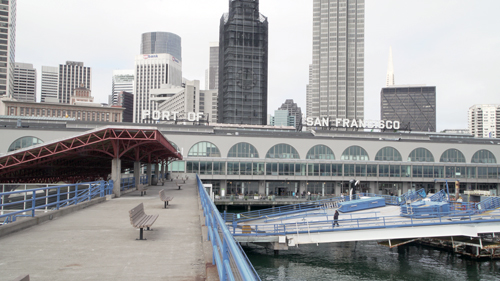 Rapid Transit) train to the center of the city
and then a bus for 4 stops. Then we are at the Parker Guesthouse, not
far from the Castro district. We check into the room and rest. Then I go
downtown to the Apple Store on Union Square to buy a new iPad mini. I
also get a prepaid SIM at AT&T
for my iPhone. I am helped well and quickly. I take an E-SIM with
prepaid plan of 15GB of data, unlimited calls and text messages and I
get a US phone number. I can still be reached on my Dutch number via the
Dutch e-SIM.
Rapid Transit) train to the center of the city
and then a bus for 4 stops. Then we are at the Parker Guesthouse, not
far from the Castro district. We check into the room and rest. Then I go
downtown to the Apple Store on Union Square to buy a new iPad mini. I
also get a prepaid SIM at AT&T
for my iPhone. I am helped well and quickly. I take an E-SIM with
prepaid plan of 15GB of data, unlimited calls and text messages and I
get a US phone number. I can still be reached on my Dutch number via the
Dutch e-SIM.
In the evening we eat nearby at Le Mediterranee. We watch some TV and go
to bed before eight o'clock.
Monday 15 May 2023
We sleep long and well and get up around 7 am. The breakfast is good,
but th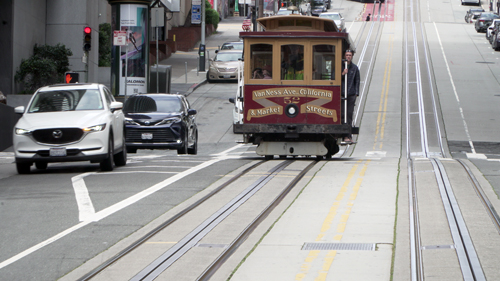 ere are no cheese or cold cuts.
ere are no cheese or cold cuts.
We take the tram (called
Metro) to Embarcadero. There is the Ferry Building, where many ferries
across the San Francisco Bay once departed. Now there are just a few
left. These days there are bridges across the bay and there is BART. The
building is now a market hall with deli food. You can also drink and eat
there. From there we walk to the first stop of the California Street
Cable Car. We ride the entire route. Still a nice experience. On the way
back we get off in front of the Street Car museum, but that turns out to
be closed on Mondays. The museum is in the same building where the
machines are located that keep the Cable Cars moving. We have a Japanese
lunch (ramen) and go back to the hotel.
In the afternoon I go to the San
Francisco Museum of Modern Art (SFMOMA). The building and the
collection are large. Many artists are unknown to me, but t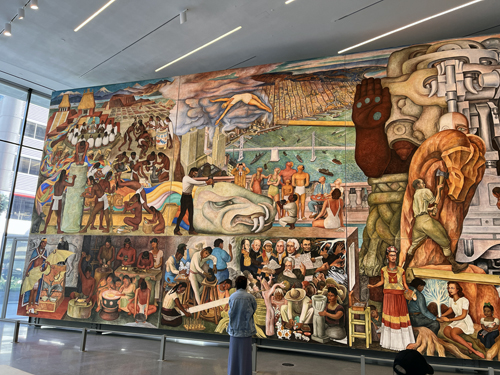 here
are quite a lot of works by Andy Warhol and Roy Liechtenstein. Also a
floor with photography and installations. The bottom two floors are free
to enter (you pay $25 for the rest). Down there you will find the
classic moderns, such as Matisse, Picasso, Braque, but also Mondrian,
Dalí, Van Doesburg, etc.
here
are quite a lot of works by Andy Warhol and Roy Liechtenstein. Also a
floor with photography and installations. The bottom two floors are free
to enter (you pay $25 for the rest). Down there you will find the
classic moderns, such as Matisse, Picasso, Braque, but also Mondrian,
Dalí, Van Doesburg, etc.
On the ground floor, a large work by Diego Rivera (1886-1957), the
husband of Frida Kahlo, takes up half the floor. A symbolist work on the
ideal of Pan-American unity. Rivera made a number of large murals in San
Francisco, but unfortunately they are no longer publicly accessible.
Back at the Guesthouse we take part in the wine hour and then go for a
pizza down the street.
Weather: cloudy at first, then sunny. 19 degrees
Tuesday 16 Mei 2023
After breakfast we take bus 33 to Haight Street, in the Haight –
Ashbury district, which was the epicenter of Flower Power in the 1960s.
The district still has an esoteric atmosphere and the residents are
mostly h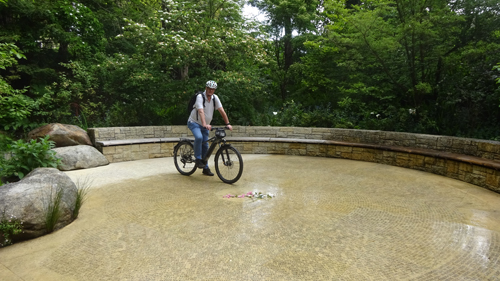 ippies from that
time. We get off at the end of Haight Street, where Unlimited Bike has a branch. We rented bikes there
for the day. Erik has an e-bike and I have a hybrid bike. We cycle into
the adjacent Golden Gate Park, the green lung of the city. We start at
the AIDS memorial grove. A grove where a granite floor with names
reminds of the victims of the AIDS epidemic in the 1980s. We cycle along
the JFK Promenade to the museums: the De Young on one side and the
California Institute of Science on the other. Then we cycle through
beautiful parkland. We turn, uphill to Stowe Lake. Boats and pedal boats
can be rented here, but it is not very busy. We drink juice. Then we
cycle on to the Bison Paddock. A kind of deer park for bison. The
animals are a bit camera shy, because they are in an area where they are
difficult to photograph. We cycle further towards the coast and arrive
at the Queen Wilhelmina Windmill. A copy of a Dutch windmill from 1903.
The garden around the mill will be replanted with, among other things,
marigolds. We continue to the beach. Here it is busy with school
classes, which get some marine life education. We cycle along the beach
to the other windmill, the Murphy Windmill. The mill was built in 1908
to pump water to the Golden Gate park, just like the Dutch Windmill we
saw earlier. It was replaced by electric pumps in 1913. The mill fell
into disrepair, but was restored in 2002 (the Dutch Windmill in 1981).
ippies from that
time. We get off at the end of Haight Street, where Unlimited Bike has a branch. We rented bikes there
for the day. Erik has an e-bike and I have a hybrid bike. We cycle into
the adjacent Golden Gate Park, the green lung of the city. We start at
the AIDS memorial grove. A grove where a granite floor with names
reminds of the victims of the AIDS epidemic in the 1980s. We cycle along
the JFK Promenade to the museums: the De Young on one side and the
California Institute of Science on the other. Then we cycle through
beautiful parkland. We turn, uphill to Stowe Lake. Boats and pedal boats
can be rented here, but it is not very busy. We drink juice. Then we
cycle on to the Bison Paddock. A kind of deer park for bison. The
animals are a bit camera shy, because they are in an area where they are
difficult to photograph. We cycle further towards the coast and arrive
at the Queen Wilhelmina Windmill. A copy of a Dutch windmill from 1903.
The garden around the mill will be replanted with, among other things,
marigolds. We continue to the beach. Here it is busy with school
classes, which get some marine life education. We cycle along the beach
to the other windmill, the Murphy Windmill. The mill was built in 1908
to pump water to the Golden Gate park, just like the Dutch Windmill we
saw earlier. It was replaced by electric pumps in 1913. The mill fell
into disrepair, but was restored in 2002 (the Dutch Windmill in 1981).
We cycle via Martin Luther 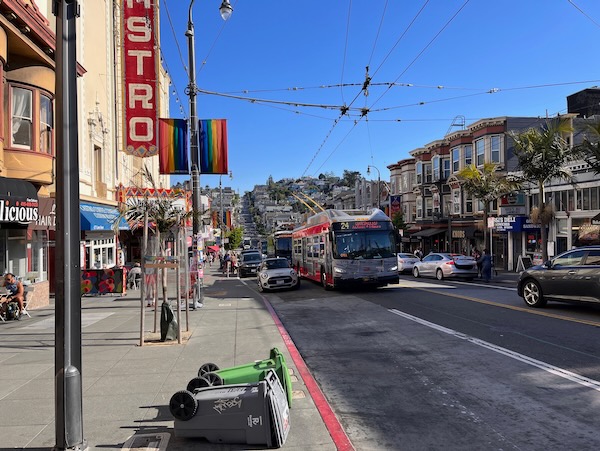 King Drive back to
the De Young,
where we have lunch. After lunch we cycle to the bike rental and take
the bus back to the guesthouse.
King Drive back to
the De Young,
where we have lunch. After lunch we cycle to the bike rental and take
the bus back to the guesthouse.
In the afternoon we walk to the basilica San Francisco de Asisi. This
church was built in 1913 on the site of the original Spanish mission
from 1776. San Francisco was one of 20 Spanish mission churches on the
west coast at the time. The mission remained a village until the Gold
Rush of 1849 when the town exploded. The church was destroyed by the
great earthquake in 1908 and rebuilt. The original mission chapel was
spared. In 1952 the church was elevated to a basilica.
Around 5 pm we take the bus to Castro Street. Here we have a drink at
Twin Peaks Tavern, the first gay bar to have large transparent windows
facing the street so that everyone could see who was inside. The
audience is aging. Then we walk down Castro Street. Still the epicenter
of gay culture, but you can see that especially the older guard feels at
home here. We have a drink at Midnight Sun, a video bar that was also
there in 1993 when I first visited. The audience is still the same age
as mine.
After the cocktails we walk to Frances,
a good restaurant on 17th Street. It's a small restaurant, but very
loud. This is partly due to a lack of upholstery and sound proofing. The
food is delicious. We take the Chef Tasting menu. A four-course menu,
but the first three courses consist of two parts. We add a wine pairing.
The pace is high and after 75 minutes we are done.
Weather: sunny and 21 degrees. In the evening it cools down to 15
Wednesday 17 May 2023
After breakfast we order a ride with Uber. We are picked up in a
spacious Toyota Sienna. The driver says little, but Golden Gate is very
correct and takes us to the Hertz rental location on Beach Street, near
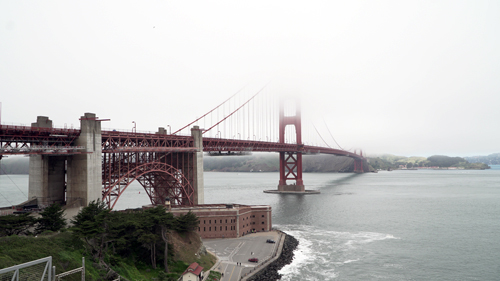 Fisherman's Wharf. Because I am a Gold member, the
procedure is super fast. We get a Nissan Ultima. We drive to the visitor
center of the Golden Gate bridge. It belongs to the Golden Gate National Park. In the visitor center
we buy the “America
the Beautiful Pass”, which gives access to all National Parks,
Monuments, etc. for $80 for a year. An advantage, because our first park
Yosemite already costs $37 for a day.
Fisherman's Wharf. Because I am a Gold member, the
procedure is super fast. We get a Nissan Ultima. We drive to the visitor
center of the Golden Gate bridge. It belongs to the Golden Gate National Park. In the visitor center
we buy the “America
the Beautiful Pass”, which gives access to all National Parks,
Monuments, etc. for $80 for a year. An advantage, because our first park
Yosemite already costs $37 for a day.
We drink coffee in the cafeteria with a view of the bridge, which is
unfortunately shrouded in fog. We have to register our car for the
bridge tolls via a website. Then we drive over the bridge out of town.
We then take the Richmond bridge across the bay towards Oakland and then
continue southeast. After 4 hours we are in Mariposa, a village near
Yosemite National Park. We are staying at the Quality Inn. A little
dated, but clean and functional. We rest and do some shopping.
In the evening we eat Mexican at Castillo restaurant near the hotel.
Weather: in SF 17˚; in Mariposa 32˚
Thursday 18 May 2023
We get up at 6 o'clock. We want 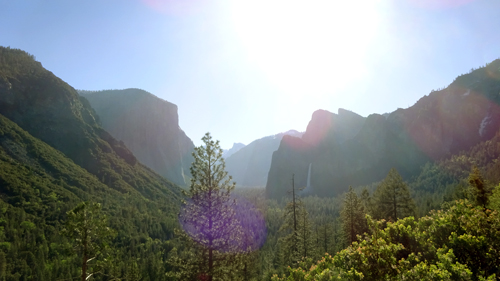 to beat the crowds
in Yosemite
and avoid the traffic jams. The breakfast at the hotel is not much brag
about. We set off at 6:30 am and arrive at the park around 8:00 am. The
way there is already beautiful, through the valley of the Merced river.
to beat the crowds
in Yosemite
and avoid the traffic jams. The breakfast at the hotel is not much brag
about. We set off at 6:30 am and arrive at the park around 8:00 am. The
way there is already beautiful, through the valley of the Merced river.
In Yosemite we first look at the Tunnel View. No tunnel vision, but a
viewpoint at the entrance of a tunnel through a mountain. The view over
the valley is beautiful, with the El Capitan mountain in the middle. We
drive down and arrive at the Upper Yosemite waterfall. Also very
beautiful. Up close you get wet from the spray water and the swirling
river. We then go to the Yosemite village for coffee. From there we
drive to the Sentinel bridge, but the parking lot is closed there. Then
to Valley View. Nice viewpoint over the valley. Bridal Veil 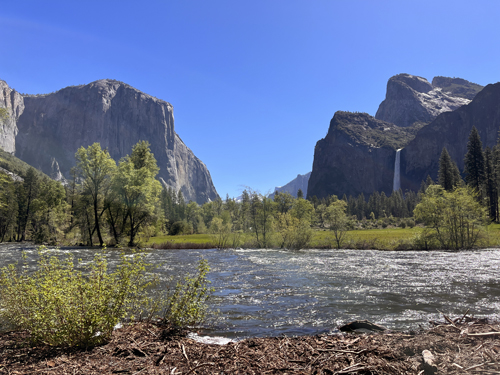 falls
is inaccessible due to roadworks and Glacier Point will not be
accessible by car until July due to heavy snowfall last winter. We then
go back to the exit and stop a few more times for beautiful views and
waterfalls. It has become much busier in the meantime and there is a
long traffic line in front of the entrance.
falls
is inaccessible due to roadworks and Glacier Point will not be
accessible by car until July due to heavy snowfall last winter. We then
go back to the exit and stop a few more times for beautiful views and
waterfalls. It has become much busier in the meantime and there is a
long traffic line in front of the entrance.
Back in Mariposa we have lunch at 1850 restaurant and in the afternoon
I dip into the swimming pool of the hotel. In the evening we eat pasta
at a pizzeria. But that's more of a greasy spoon. It's fills, it must be
said.
Weather: in Mariposa 33˚, in Yosemite 17˚ and sunny
Friday 19 May 2023
From Mariposa, where we stayed, it is about a 2 hour drive to
Sacramento. Sacramento became the capital of California in 1850. At the
time it was the only significant city, but it was soon overtaken by San
Francisco and Los Angeles. It is a not too big a city, dominated by the
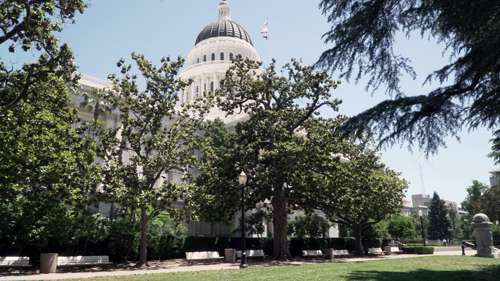 government building, the State Capitol. We visit it with a guide. We are
shown the meeting rooms of the California Assembly and Senate.
Interesting. In the portrait gallery of former governors, Ronald Reagan
(1967-75) – who would become president in 1980 – and Arnold
Schwarzenegger (2003-11) – nicknamed the Governator – stand out. The
portrait of Jerry Brown (1975-83) was not allowed to hang with the
others. It was too modern for the California delegates' taste.
government building, the State Capitol. We visit it with a guide. We are
shown the meeting rooms of the California Assembly and Senate.
Interesting. In the portrait gallery of former governors, Ronald Reagan
(1967-75) – who would become president in 1980 – and Arnold
Schwarzenegger (2003-11) – nicknamed the Governator – stand out. The
portrait of Jerry Brown (1975-83) was not allowed to hang with the
others. It was too modern for the California delegates' taste.
In the basement - now called the Lower Level - is a statue of Ronald
Reagan, who, as said, would become President of the US. After the tour,
we go back to the hotel and have a rest. In the evening we eat Indian.
Good food, but the service falls a bit short. Our credit cards are
declined. We pay cash.
Weather: warm and sunny, 30˚
Saturday 20 May 2023
We drive to Old Sacramento, the oldest part of the city on the
Sacramento River near the Tower Bridge. It is a few blocks with 19th
century wooden buildings. It is an night life area, which especially
comes alive at night. Here is also the California Railroad Museum. There
is rolling stock that can run on a museum track. There are ships on the
riverbank, which function as a hotel or as a river cruise boat. A
special attraction is a group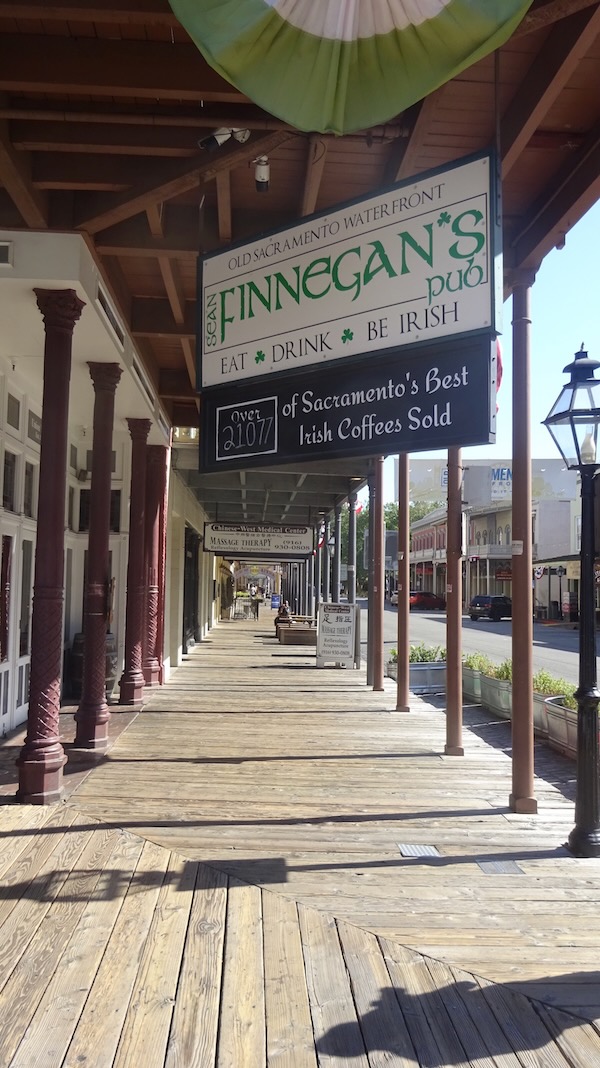 of sea lions, which hang out on a jetty for pleasure boats. The sea
lions have swum up the river in search of food. The local TV news
wonders if the animals will stay, because the municipality has built the
jetty for $ 3.5 million, but not for the sea lions.
of sea lions, which hang out on a jetty for pleasure boats. The sea
lions have swum up the river in search of food. The local TV news
wonders if the animals will stay, because the municipality has built the
jetty for $ 3.5 million, but not for the sea lions.
We then drive to the California
museum. The museum is dedicated to the history and people of the
state. There is a room dedicated to gender equality and female role
models from the state, such as Nancy Pelosi (Speaker of the House of
Representatives in Washington DC), Megan Rapenoe (captain of the US
women's soccer team), and Janet Yellen (Central Bank President and now
Minister of Finance). There is also an area dedicated to diversity. On
the ground floor it is mainly about population groups that have not
always gotten a good deal, such as the Native Americans, the Chinese and
the Japanese. The Chinese immigrants played an important role in the
construction of the Trans-American Railroads from the East Coast to
California, for which they only recently received recognition. After the
Japanese attack on Pearl Harbor in 1941, the Japanese were interned in
concentration camps. Their loyalty to America was questioned. Later in
the war, a segregated company was established in the army with
American-Japanese soldiers. They felt a burden to prove that they were
American first and Japanese second. After the war, the American Japanese
still suffered a lot of racism.
After the museum we go to the hotel and have a sandwich at Subway. In
the afternoon we go to the Sutter Fort Historical Park. This is the original
fort that Swiss immigrant Sutter founded as an outpost for the conquest
of California from the Indians and Spaniards. Sacramento arose from the
fort, which became the capital of the new state in the Union in 1850.
In the evening we eat at Waterboy, a great restaurant in Midtown, in the
gay quarter of the city. We have an excellent meal and after dinner we
visit two gay bars: Mercantile Saloon and The Depot.
Weather: sunny, 27˚C
 |
Other Travel |  |
| back | continue |